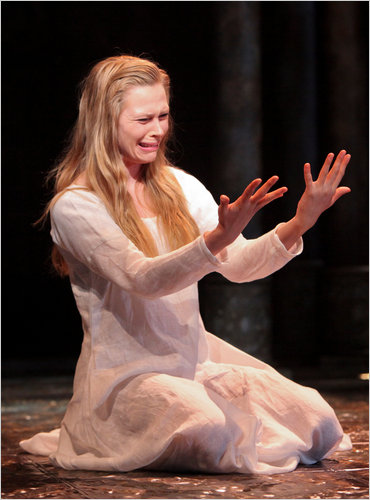Flipping over the year 10 English yearly exam paper to see a
question dissecting the “unconventional power of Lady Macbeth” is a pretty
standard high school experience. We’ve all been there – analysing the scandal
and impact of her deadly prowess and unfeminine manipulation.
It is a popular reading of the play to see Lady Macbeth as a
main instigator of the action and bloodshed; a unique example of a female as
such a plot device. Resultantly, it is common to hear proclamations of the
play's progressiveness and Shakespeare’s admirable feminist qualities. However this
kind of interpretation is pretty far flung and misrepresentative of what female
empowerment in literature really looks like.
Not going to lie, Lady M’s “Unsex me here” speech is one of
the most kickass female soliloquies in all of Shakespeare’s works. Her blatant
disdain of typical female gender roles like childbearing and motherhood is
pretty damn powerful, and the wicked, sanguineous language of her speeches are brutally un-feminine. And at face value it would seem that Lady M is indeed a
sort of 0.5th wave feminist icon, and Shakespeare was an Elizabethan
“good guy”. It is a nice sentiment, and unfortunately pretty unfounded.
It is not enough to substantiate Lady Macbeth’s feminist
status just by her initial characterisation. Although she seems like a strong
and unusually virile, bloodthirsty leading lady, the continuation and
resolution of her plot-line undermines this opening image. By the time Duncan is
dead, the plot is clearly in Macbeths hands, with Lady M’s influence growing
smaller and smaller. She suffers the haunting guilt just as strongly as her
husband, and in fact seems more susceptible to the ensuing madness. By the beginning
of act 5, our “strong independent Scottish woman” is a drooling wreck of hallucinations
and madness (see also: Shakespeare is saneist). What we can infer from her
emotional collapse is that she is in fact being punished for daring to oppose her assigned gender roles. The fact
that a character who challenges social norms exists isn’t significant. What matters
is how they’re presented.
Why is this? A fictional character such as the shocking Lady
Em does not have their own autonomy. They're made up, duh. What this means is
that they are empowered/objectified/glorified/condemned as per according to the
lenses of their creator. They cannot command their own power, because they are
completely at the mercy of whoever allocated their characterisations. So Lady M
cannot be a powerful and positive representation of women "just because.” She needs
that to be part of the intention behind her character, and evident in the
outcome of her storyline. Which it isn’t.
Back to the play. It is clear that Lady Macbeth is condemned; she goes mad and dies. Pretty obvious damnation right there. It is then an easy conclusion to say that this is at least partially because she defies her natural path and hence commits great sin. That is, she betrays her womanhood and steps inappropriately out of her position and must be punished.
This trope is seen throughout literature, where supposedly
empowered and strong women are condemned for defying the natural order of
things. For example, Mina in Bram Stoker’s Dracula is corrupted into a vampire
once she displays “masculine” standards of bravery, leadership and sexuality. Even
Alaska in John Green’s Looking for Alaska is killed off for being enigmatically
independent and extremely sexually active. Of course, John Green and perhaps even
Stoker and Shakespeare didn’t intend to perpetuate inherently patriarchal views
of women in their literature. But the
strong-woman-who-must-inevitably-fall-from-grace trope is a “seller”; it fits
many tried and tested formulae for good stories, and is commonly used out of
sheer cliché.
So fill me from the crown to the toe topful o’ direst feminist
education/Make thick my blood/Stop up the access and passage to problematicness.
Exeunt
Hannah


pretty cool article
ReplyDeleteMhmmmmm ur wrong
ReplyDeleteur stoopid
ReplyDelete